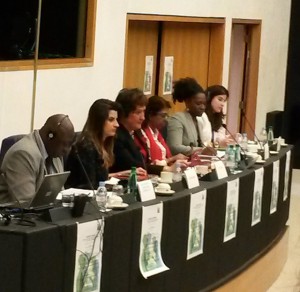On March 15th, I had the opportunity to talk about strategies to promote sexual and reproductive health and rights (SRHR) at the Women’s Forum of the 27th Africa, the Caribbean, and the Pacific (ACP)-EU Joint Parliamentarian Assembly (JPA), Strasbourg, France. The JPA is included in the Cotonou Partnership Agreement as the parliamentarian body of ACP-EU relations and brings together 78 representatives of both EU and ACP countries twice per year. The Women’s Forum usually takes place ahead of the JPA plenary and the different committees on Saturday morning.
 DSW was invited by Member of European Parliament (MEP) Zita Gurmai (S&D, Bulgaria), one of the co-chairs.
DSW was invited by Member of European Parliament (MEP) Zita Gurmai (S&D, Bulgaria), one of the co-chairs.
While representing DSW, I focused on two types of strategies to promote SRHR: how to better increase demand, at the community level, and how to promote SRHR in policy frameworks, at international level. The first approach was mainly inspired by DSW’s own strategies, which include i. youth clubs, ii. integrated approaches to SRHR and livelihoods, iii. civic education and evidence-based decision-making and iv. allocation of health budgets. In the second part of the speech, an update was provided regarding both current discussions on the 11th European Development Fund (EDF), which is the main EU funding instrument in ACP countries, and on the negotiations around the International Conference on Population and Development (ICPD) beyond 2014 and the post-2015 agenda.
Several of the present MPs emphasized the importance of SRHR as a key tool for women’s empowerment. The forum was hence an opportunity to highlight the situation in the MPs’ home country and to call for further action. Also, co-President of the JPA, MP Fitz Jackson (Jamaica), emphasised the role that men should have in promoting SRHR and defended that SRHR should go beyond what is defined in political institutions and be part of societal development, as “where women are frustrated, so will be men and hence the entire society”.
Secretary General of ACP, Alhaji Muhammad Mumuni, wrapped up the session by emphasizing the importance of women to be able to choose for their own body and health and restated the need of using different instruments, such as the EDF, in order to finish the unfinished business of MDG5, on reducing maternal mortality.
For me, participating in this type of discussions was a great opportunity to promote support to SRHR, in particular now. On the one hand, ACP-EU Parliamentarians, Ambassadors and CSOs working on SRHR in ACP-EU countries do not often have the opportunity to engage in this type of dialogue. On the other hand, there are ongoing discussions about conditionality of European funds to those ACP countries that have recently adopted bills criminalizing lesbian, gay, bisexual, and transgender (LGBT) – eg the EP adopted a joint resolution in mid-March calling for consultations to suspend some of these countries from the Cotonou Partnership Agreement. Actually, this was also a hot topic in the Pan-African-European Parliamentary Summit that took place in Brussels just last week, where disagreement between MPs became clear. And, last but not least, there are now global pleas to integrate the ICPD review in the post-2015 agenda, both processes now at an exciting time for negotiations, so that SRHR are not neglected in the upcoming development agenda.
This meeting is also an opportunity to emphasize the need for a multi-stakeholders participatory approach in defending and raising SRHR profile in all ongoing discussions. It was encouraging to see that participation was extremely positive, with around 70-80 participants, of which a third were men …even at such an early hour as from 8 to 10am on a Saturday.


